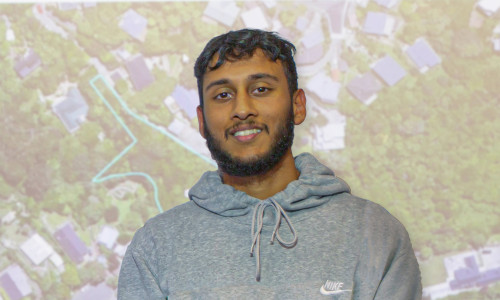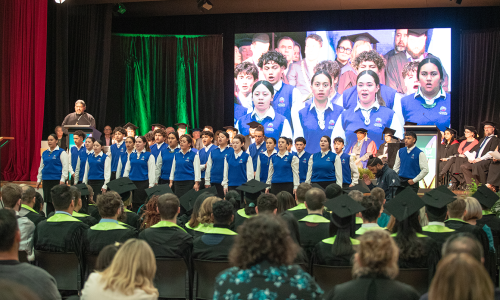Civil Engineering tutor Swetha joined Whitireia and WelTec in 2023, bringing with her a vast background of experience, and a passion for instilling in students a sense of curiosity, enthusiasm, and dedication to the field. Swetha teaches land surveying, geotechnical engineering, highway engineering, structures and materials (civil) courses. We spoke to her about what skills ākonga gain, potential pathways, the opportunities they have to connect with industry, why she loves teaching, and her experience in the area.
What are the main components of Civil Engineering programme?
We offer diplomas in civil and mechanical engineering. The main components of these programmes are the core engineering courses, mathematics, laboratory work, and design projects.
In civil engineering, we offer courses related to geotechnical engineering, water and waste management, highway engineering, structures, materials, fluid mechanics, land surveying and mathematics. Students can study part-time or full-time, and proudly, Whitireia and WelTec is the sole provider of the diploma in civil engineering programme in the Wellington region.
What sort of skills do you teach students studying civil engineering?
Students studying engineering develop a wide range of technical, analytical, and interpersonal skills. Technical skills include proficiency in mathematics, understanding of engineering principles, theories, and methodologies as well as the ability to use engineering software and tools for analysis, simulation, and design.
Problem-solving skills enhance creativity and innovation to devise novel solutions and designs while developing critical thinking and innovation. They also develop design and technical proficiency in drafting, modelling, and creating technical drawings using computer-aided design (CAD) software.
Effective written and oral communication skills involve conveying technical information, presenting project proposals, and writing reports. The ability to communicate complex technical concepts to diverse audiences, including colleagues, and active listening skills to understand and respond to feedback from peers and mentors are developed through the course of the programme.
Throughout the programme, there is emphasis placed on health and safety standards, ethical and professional conduct as well as lifelong learning; preparing engineering students to tackle complex challenges, contribute to technological innovation, and make meaningful contributions to society through their work in various industries and sectors.
Are there any opportunities for students to connect with industry?
We organise multiple site visits for students throughout the year. Last year, our civil engineering students visited Seaview Wastewater Treatment Plant to provide them with firsthand exposure to sewage treatment processes and operations. They also visited Totara Park, Moonshine Bridge and Harcourt Park. We had a guest lecture by Fulton Hogan team to gain industry insights into emerging technologies, where diverse perspectives and experiences are shared to enrich the learning experience.
We encourage and have plans for more visits to enhance our student's understanding of industry-standard engineering practices and construction techniques while providing networking opportunities for them to interact with professionals, establish connections, and build networks within the civil engineering community.
What career opportunities and pathways are there for graduates?
Graduates of our civil engineering programme have a variety of career opportunities and pathways available to them: civil engineering technician; construction inspector; CAD technician; surveying technician; estimator for project planning, budgeting and resource allocation; engineering assistant and land development technician. Graduates can also pursue careers in land development, assisting with site planning, land use analysis, and environmental impact assessment for residential, commercial, and industrial development projects.
They may also be engaged as field engineers and project coordinators assisting in the planning, scheduling, and coordination of civil engineering projects, managing resources, communicating with stakeholders, and tracking project milestones and deliverables.
There are also many higher education opportunities that are available to enhance students' skills and employment opportunities in specific areas of civil engineering. Overall, the civil engineering field offers diverse paths for professional growth and advancement, allowing individuals to pursue roles that align with their interests, skills, and career aspirations.
What do you enjoy most about teaching?
I enjoy the opportunity to share my expertise and passion for civil engineering with students, introducing them to the principles, theories, and practices that form the foundation of the profession. I take pride in being part of inspiring and motivating the next generation of civil engineers, instilling in students a sense of curiosity, enthusiasm, and dedication to the field.
Education is a powerful tool for promoting social justice and equity. Teachers advocate for equal access to quality education and strive to create classrooms that celebrate diversity, challenge stereotypes, and promote empathy and understanding. I am fortunate and glad to be part of this esteemed profession.
Are you involved in any research?
I am an active researcher in the field of civil and environmental engineering and currently a doctoral researcher at the University of Auckland. I enjoy engaging in research and innovation within the field of civil engineering, exploring new technologies, methodologies, and solutions to address pressing societal challenges. I enjoy sharing my integrated research, industry and teaching experience; and help prepare students to make meaningful contributions to society through their work.
What's your experience in the area?
After gaining my bachelor’s and master's in civil engineering from the Indian Institute of Technology Kanpur in 2013, I was involved in air pollution modelling as a project engineer where I applied my technical skills to analyse and mitigate environmental impacts. Additionally, my experience as a geospatial analyst allowed me to utilize advanced GIS technologies to analyse spatial data and support decision-making processes especially for soil erosion modelling and environmental impact assessment.
As a lecturer in civil engineering in Fiji, I had the opportunity to share my knowledge and expertise with students, fostering their understanding of civil engineering principles and applications. Apart from teaching and capstone project supervision, I have been active in publishing research in collaboration with my students and colleagues globally, and successfully securing funding for projects. Through these diverse experiences in the 10+ years as an engineer and a mother of two beautiful daughters, I have developed a comprehensive skill set and a passion for addressing environmental challenges through innovative engineering solutions while engaging in work-life balance with the support of my partner Mr Sateesh Pisini and family.
Study Engineering at WelTec
Funnel your creative and innovative energy into an engineering career. Engineering skills are in constant demand. Enjoy a balance of practical and theory-based study which will set you up for an exciting career.



